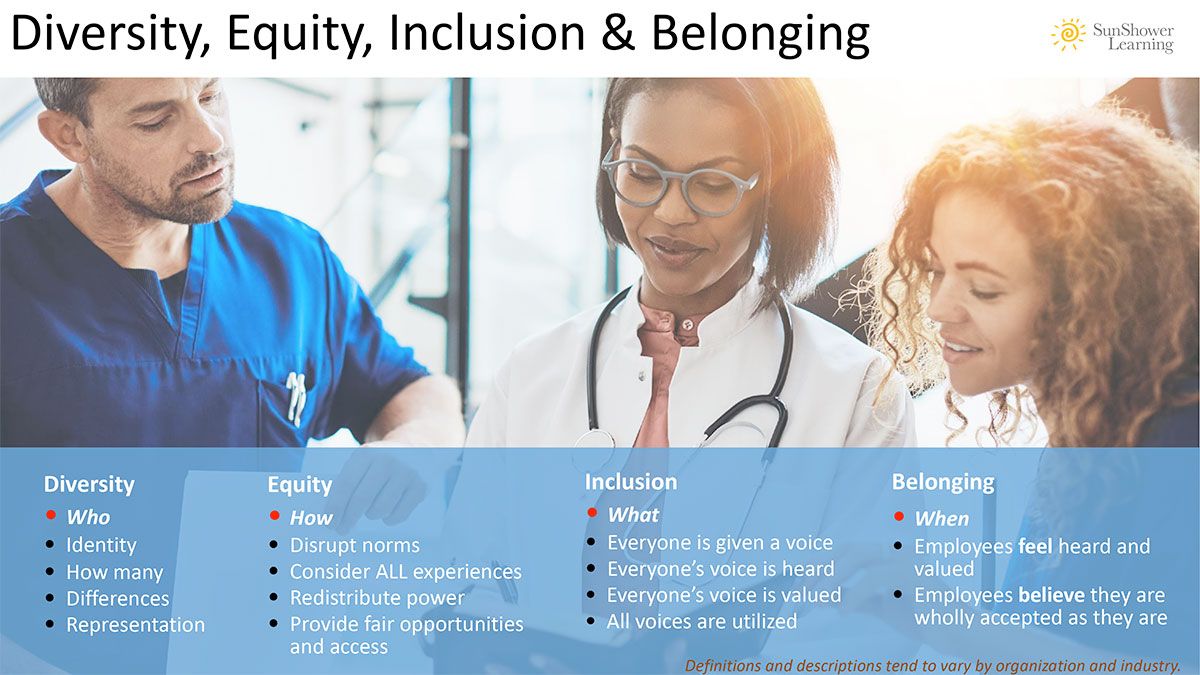Focus on DEIB to Thrive During the “Great Resignation”

Learning the lingo: Defining the terms diversity, equity, inclusion and belonging
While the terms diversity, equity, inclusion and belonging are often used interchangeably, there are distinct differences among them.
- Diversity is the presence of differences within a given environment.
- Equity is the process of ensuring that fair treatment, access and opportunity exist for all people despite their individual identities.
- Inclusion is the practice of ensuring that all voices within a diverse team of people are valued and utilized.
- Belonging is the state of feeling heard and valued. Employees feel a sense of belonging when they believe they are wholly accepted for who they truly are.
Here’s another way to think about the distinctions among these terms:
- Diversity asks, “Who is in the room?”
- Equity asks, “How are power and opportunity distributed within the room? Are there norms that have to be disrupted in order for power and opportunity to be redistributed fairly?” (Also, “Who is trying to get into the room but can’t?”)
- Inclusion asks, “Is everyone in the room being heard? Does everyone’s opinion carry weight?”
- Belonging asks, “Do employees feel that they’re being heard and respected in the room? Do they believe that they can truly be themselves and can comfortably share their authentic perspectives and ideas?”
While diversity, equity, inclusion and belonging are separate concepts, they should each be present in the workplace, and they should be equally emphasized so that all employees are engaged and able to reach their full potential without barriers.
DEIB – good for individuals and good for business
Diversity, equity, inclusion and belonging are just as good for business as they are for individual employees, and they’re much more than mere buzzwords. When DEIB is at the heart of workplace culture, the benefits are seen in every facet of the organization. It’s easier to attract, nourish and retain employees who, in turn, have higher degrees of productivity and innovation that directly contribute to increased revenue.
Research by McKinsey shows that companies that actively promote diversity, equity, inclusion and belonging are 35% more likely to achieve financial returns above their respective national industry medians. A recent Deloitte study found that businesses with an inclusive culture were twice as likely to meet or exceed their financial targets. These are but two examples of the growing recognition of how critical DEIB strategies are to business performance.
For companies that want to compete in today’s talent marketplace and thrive during the “Great Resignation,” diversity, equity, inclusion and belonging must be understood and prioritized. So, if your team is considering how best to move forward with your DEIB journey, take some time to establish a baseline of common understanding of these terms. In so doing, it will be much easier to design effective strategies around them and drive meaningful change for your employees and your business.
****
TAKE ACTION!
- Assess employees’ sense of equity, inclusion and belonging via constructive dialogue and/or surveys. Listen in earnest and act on the findings.
- Establish employee resource groups (ERGs) (also known as affinity groups), which are employee-led workplace groups organized around common identities, interests or backgrounds. They enable employees to provide support to one another, help with personal or career development, create a safe space, build community and drive transformation.
- Support inclusion by celebrating a broad spectrum of holidays.
- Normalize the sharing of preferred gender pronouns and avoid terminology that makes the workplace less inclusive (e.g., “blacklist” or “master” and “slave” in programming).
- Review your company’s policies, practices and rules that have potentially created an inequitable workplace due to barriers that prevent some employees from reaching their full potential.
- Ensure that your organization’s top decision-makers represent a wide variety of perspectives.
- Take a close look at hiring, advancement, promotion and attrition.
- Have transparency around wages so that there’s common understanding of how salaries tie to job performance and responsibility. Consider including a wage range within job descriptions.
Implement educational programs.
- Inclusion in Action: 9 Skills – offers a framework and specific skills for communicating and collaborating across differences.
- Disarming Microaggressions with Dr. Derald Wing Sue – provides understanding of microaggressions, how to address in the moment, and how to recover and rebuild trust to create a more psychologically safe workplace. (link to course)
- Being a Kind Leader with Dr. Robin Johnson – teaches 6 S.K.I.L.L.S. to help you lead the multicultural team inclusively.

